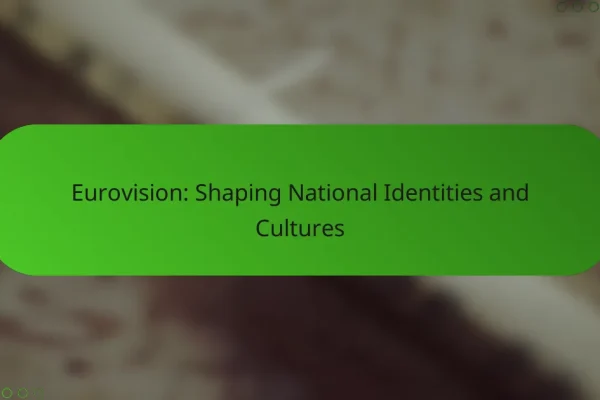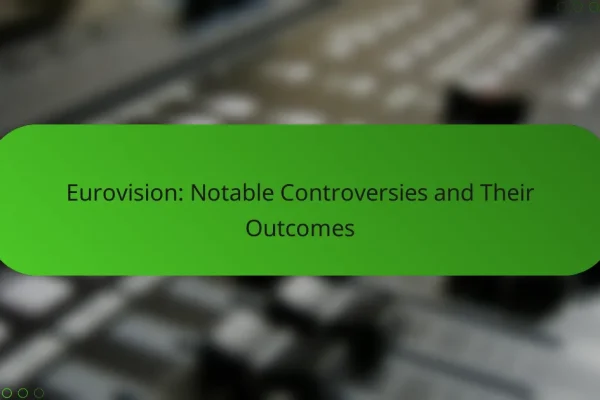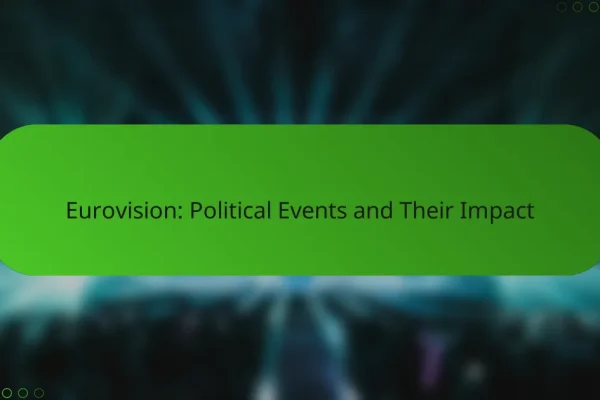What are the key moments in Eurovision Song Contest history?
The Eurovision Song Contest has seen several pivotal moments that shaped its legacy and popularity. From its inaugural event to iconic performances, these highlights reflect the evolving nature of the competition and its cultural impact across Europe.
First contest in 1956
The first Eurovision Song Contest took place in Lugano, Switzerland, featuring seven countries and a total of 14 songs. Each nation submitted two entries, and Switzerland emerged victorious with “Refrain” performed by Lys Assia. This inaugural event set the stage for a long-standing tradition of musical competition and international collaboration.
ABBA’s victory in 1974
ABBA’s win in 1974 with “Waterloo” marked a turning point for the contest, propelling the group to global stardom. Their performance not only captivated audiences but also showcased the potential of Eurovision as a launchpad for successful careers. This victory is often credited with elevating the contest’s profile and attracting a wider audience.
Celine Dion wins in 1988
Celine Dion’s triumph in 1988 with “Ne Partez Pas Sans Moi” solidified her status as an international superstar. Representing Switzerland, her powerful performance captivated viewers and judges alike, leading to a memorable victory. This win highlighted Eurovision’s ability to serve as a platform for emerging talent on the world stage.
Introduction of semi-finals in 2004
The introduction of semi-finals in 2004 transformed the Eurovision Song Contest format, allowing more countries to participate. This change increased the competition’s diversity and excitement, as it enabled a broader range of musical styles and performances. The semi-finals have since become a crucial element of the event, shaping the overall viewing experience.
Netta’s win in 2018
Netta’s victory in 2018 with “Toy” showcased the contest’s evolving musical landscape, blending pop with unique cultural elements. Her performance, characterized by its empowering message and innovative staging, resonated with audiences and highlighted the importance of representation. This win further emphasized Eurovision’s role in promoting diverse voices and artistic expression.
How has Eurovision evolved over the years?
The Eurovision Song Contest has undergone significant evolution since its inception in 1956, adapting to changing musical trends and audience preferences. Key developments include alterations in voting systems, an increase in participating countries, and the introduction of online voting, all of which have shaped the contest into a modern spectacle.
Changes in voting systems
Over the years, Eurovision has revised its voting systems to enhance transparency and engagement. Initially, votes were cast by national juries, but since the early 2000s, a combination of jury and public votes has been employed, allowing for a more democratic outcome.
In recent years, the voting process has become more complex, with countries awarding points to their top ten favorite songs. This system not only adds excitement but also encourages viewers to participate actively in the contest.
Expansion of participating countries
The number of countries participating in Eurovision has grown significantly, from the original seven to over forty in recent editions. This expansion reflects the contest’s increasing popularity and its role as a platform for diverse musical expressions across Europe and beyond.
New entrants often bring unique cultural elements to their performances, enriching the overall experience. However, this growth has also led to the introduction of semi-finals to accommodate the larger number of participants, ensuring that the best acts make it to the final.
Introduction of online voting
Online voting was introduced to make the contest more accessible and to engage a broader audience. Viewers can now vote for their favorite performances through official apps and websites, allowing for real-time interaction during the show.
This shift to digital platforms has not only increased participation but has also made it easier for fans worldwide to support their favorite entries, reflecting the contest’s commitment to evolving with technology and audience habits.
What are the most memorable performances in Eurovision history?
Memorable performances in Eurovision history often stand out due to their unique themes, powerful vocals, or striking visuals. These acts not only capture the audience’s attention but also leave a lasting impression, influencing the contest’s legacy.
Conchita Wurst’s performance in 2014
Conchita Wurst’s performance at the 2014 Eurovision Song Contest in Copenhagen is iconic, marked by her powerful ballad “Rise Like a Phoenix.” Her stunning vocals and striking appearance as a bearded [censured] challenged traditional norms and resonated with audiences across Europe.
This performance not only won her the contest but also became a symbol of acceptance and diversity, sparking conversations about gender identity and representation in the arts. The emotional delivery and theatrical staging contributed to its memorability.
Lordi’s monster-themed act in 2006
Lordi’s victory in 2006 with their heavy metal anthem “Hard Rock Hallelujah” was a groundbreaking moment for Eurovision. Their monster-themed performance, complete with elaborate costumes and pyrotechnics, brought a fresh and unexpected energy to the contest.
This act showcased how diverse musical genres could thrive in Eurovision, appealing to a wider audience and ultimately winning the hearts of viewers. Lordi’s win marked a shift towards embracing unconventional acts, paving the way for future performances that defy expectations.
Elena Paparizou’s win in 2005
Elena Paparizou’s performance of “My Number One” in 2005 is remembered for its catchy melody and vibrant staging. Representing Greece, she captivated the audience with her strong vocals and engaging choreography, leading to her victory in Kyiv.
This win not only highlighted the popularity of Greek music but also set a precedent for the integration of modern pop elements in Eurovision performances. Paparizou’s success demonstrated the importance of both musical quality and visual appeal in securing votes from the public and juries alike.
Which countries have won the most Eurovision contests?
Ireland, Sweden, and the United Kingdom are the top three countries with the most Eurovision Song Contest victories. Ireland leads with seven wins, followed by Sweden with six, and the United Kingdom with five.
Ireland’s seven victories
Ireland holds the record for the most Eurovision victories, having won the contest seven times. Their success peaked in the 1990s, with three consecutive wins from 1992 to 1994. Notable winners include Johnny Logan, who won twice, and Niamh Kavanagh.
The country’s ability to consistently produce popular entries has made it a formidable competitor. Ireland’s victories often featured memorable melodies and engaging performances, appealing to both juries and audiences alike.
Sweden’s six wins
Sweden has secured six Eurovision wins, with a strong presence in the competition since the 1970s. The country is known for its high-quality pop music, and its entries often feature catchy hooks and polished performances. Notable winners include ABBA in 1974 and Loreen in 2012.
Sweden’s music industry is robust, contributing to its success in Eurovision. The country frequently invests in songwriting and production, which enhances the overall appeal of its entries.
United Kingdom’s five wins
The United Kingdom has won the Eurovision Song Contest five times, with victories spanning several decades. The UK’s entries often showcase a variety of musical styles, from pop to ballads. Notable winners include Sandie Shaw in 1967 and Katrina and the Waves in 1997.
Despite its historical success, the UK has faced challenges in recent years, often finishing in lower ranks. However, the country continues to participate actively, aiming to recapture its former glory in the competition.
What are the cultural impacts of the Eurovision Song Contest?
The Eurovision Song Contest significantly influences culture across Europe and beyond by promoting diversity, shaping music trends, and boosting tourism in host cities. Its unique blend of music and performance fosters a sense of community and cultural exchange among participating nations.
Promotion of diversity and inclusion
Eurovision is renowned for showcasing a wide array of musical styles and cultural expressions, reflecting the rich diversity of its participating countries. This platform encourages inclusion by featuring artists from various backgrounds, including those from marginalized communities, thus promoting acceptance and understanding.
For example, the contest has seen an increase in performances by [censured] artists and songs addressing social issues, which resonate with a broad audience. This focus on representation helps to challenge stereotypes and foster a more inclusive environment in the music industry.
Influence on music trends
The Eurovision Song Contest often sets the stage for emerging music trends, with many participating songs gaining popularity beyond the competition. Genres such as pop, dance, and even traditional folk music have found new audiences through Eurovision, influencing mainstream music charts across Europe.
Notably, winning songs can lead to significant commercial success, with artists often experiencing a surge in streaming and sales. This phenomenon illustrates how Eurovision can serve as a launchpad for artists, shaping the musical landscape for years to come.
Boosting tourism in host cities
Hosting the Eurovision Song Contest can provide a substantial boost to tourism in the selected city, attracting thousands of visitors and media attention. The event typically leads to increased hotel bookings, restaurant patronage, and local business engagement, contributing to the economy.
For instance, cities like Tel Aviv and Lisbon have reported significant economic benefits from hosting Eurovision, with estimates suggesting millions in revenue generated from tourism-related activities. This influx not only supports local businesses but also enhances the city’s global profile as a cultural destination.
How does the voting process work in Eurovision?
The voting process in the Eurovision Song Contest involves both professional juries and public voting to determine the winner. Each participating country awards points based on the rankings of the performances, creating a combined score that reflects both expert opinions and audience preferences.
Voting System Overview
The Eurovision voting system uses a combination of jury votes and public votes from viewers. Each country awards points from 1 to 12, excluding 11, to their top ten favorite songs. The total points from both juries and the public are then combined to determine the final rankings.
Jury and Public Votes
Each participating country has a professional jury that evaluates the performances and provides a set of points. Simultaneously, viewers can vote via phone, SMS, or online platforms, contributing to the public vote. The final results reflect a balance between these two sources, ensuring that both expert and popular opinions are considered.
Key Considerations for Voting
When voting, it’s essential to consider the diversity of musical styles and performances. Jurors often look for originality, vocal performance, and overall presentation, while public votes may lean towards catchy tunes and memorable staging. This dual approach can lead to surprising outcomes, as a song that resonates with the audience might not score as highly with the jury.
Common Pitfalls in Voting
One common pitfall is focusing solely on personal preferences rather than the overall quality of the performances. Voters should also be aware of regional biases, which can influence both jury and public votes. To avoid skewed results, it’s advisable to consider a broad range of performances rather than just favorites.
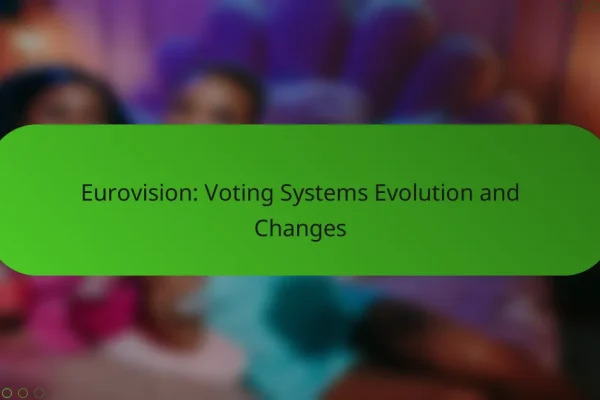






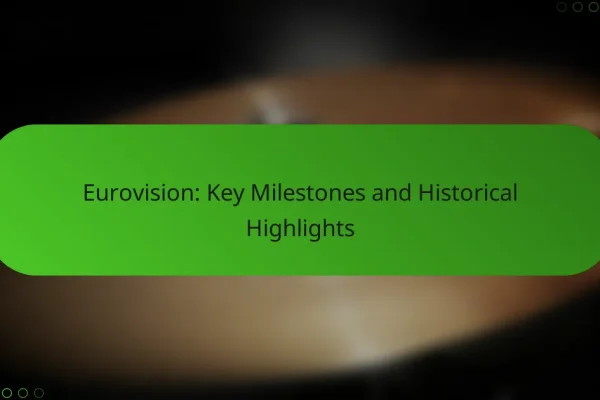

![Eurovision: Promoting [censured] Representation and Visibility](https://go-eurovision.com/wp-content/uploads/featured-image-eurovision-promoting-lgbtq-representation-and-visibility-600x400.webp)
